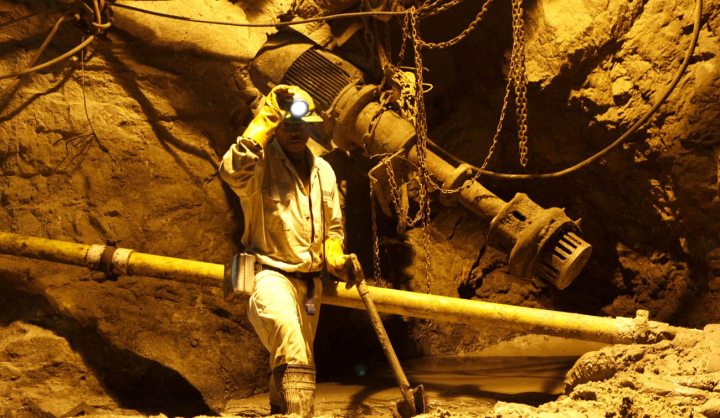South Africa
Gold negotiations: A test of trust

Wage negotiations in the gold sector start on Monday. The industry's stability and future growth is up against urgent demands to increase pay. The negotiations will test the trust between labour and business. If they can't find that trust, workers will lose their jobs and production will suffer. By GREG NICOLSON.
Shortly after beating Frans Baleni to become National Union of Mineworkers (NUM) general secretary, David Sipunzi recently set the scene for the wage negotiations in the gold industry. “Nothing has changed. We are still being paid under the Apartheid wage structure,” he told Reuters, a hard-line approach that’s become standard from unions in mining in recent years.
Negotiations between labour and AngloGold Ashanti, Sibanye Gold, Harmony Gold, Evander Gold Mines, and Village Main Reef, all represented by the Chamber of Mines, begin on Monday, and will test the levels of trust between unions and employers. The discussions are likely to be tense, calling for new solutions to a challenge that pits the industry’s viability against strong calls for higher wages.
“We expect them to meet our demands. Eighty percent of just over R5,000 is not too much. The CEOs are raking in millions. But the indications are that they are going to plead poverty,” Sipunzi, whose leadership will be tested in these negotiations, continued. Discussions will include the Association of Mining and Construction Workers Union (AMCU), Solidarity and Uasa, but as the majority union NUM will play a leading role in the central bargaining negotiations. (AMCU represents a reported 29 percent of gold workers, a figure the union disputes.)
NUM and AMCU both want substantial increases. After the 2013 wage agreement, entry-level workers earned a basic monthly wage of R5,787 and rock drill operators R7,424. Combined with provident fund, medical, housing, and holiday leave benefits, plus average overtime and bonus incentives, those figures jump to R12,578 and R15,085, claim the gold industry.
Those final figures seem relatively high, but the unions will push for large increases in regards to the basic wage. They have the sentiment of Marikana behind them and both unions are competing for members, with AMCU trying to increase its dominance in gold like it has in platinum. Both NUM and AMCU will hope to achieve higher increases than the 8 percent and 7.5 percent received in 2013.
The gold industry says the demands are not affordable. South Africa has enormous amounts of gold reserves, but in the last ten years the industry’s production and contribution to the country’s GDP has halved. Of the 10 largest gold producing nations, countries like China, Canada and Brazil saw significant increases in production between 2002 and 2013 whereas South Africa has seen the highest rate of decline.
The gold companies cite statistics showing wages have risen at above inflation levels while the number of workers in gold in South Africa has fallen and productivity has not increased. The price of gold has dropped, offset partly by the falling value of the rand to the dollar. Capital expenditure is low. Ageing infrastructure and the need for deep shafts are expensive challenges. Around half of the companies in the industry are either not profitable or marginal.
Chamber of Mines negotiator Dr Elize Strydom said earlier this month, “The industry is at a crossroads. We need a measured and strategic conversation between partners with the aim of jointly considering ways to achieve a sustainable industry that attracts investment and offers a level of employment security within realistic parameters. This clearly requires a different approach to negotiations – an approach that provides for in-depth, focused engagements and joint solution-seeking discussions. The gold companies will be tabling a proposal on an economic and social sustainability compact for the long-term benefit of all the stakeholders.”
The major mining companies know the unions are gunning for high wage increases but are framing the conversation in terms of sustainability: large increase mean the industry will continue to shrink; there’ll be job losses and no new projects to mine SA’s reserves, limiting the country’s future economic growth.
However, rivalry between NUM and AMCU and negative public sentiment towards mining companies since Marikana massacre mean there’s little sympathy for the companies’ plight.
“The social compact will include sharing the gains if the gold price goes up and if the price goes down, sharing the pain,” said Strydom recently. While the whole industry needs a structural shift, wage increases are a major short-term challenge. During this round of negotiations, the Chamber of Mines will likely try to sell other incentives: profit-sharing schemes, productivity linked increases, initiatives to tackle problems like worker indebtedness.
It’s a tough sell. Mining unions have recently pushed for simplified wage negotiations, rejecting percentage increases and demanding specific rand value increases. Unions and workers don’t trust companies, what their promises might mean, and want in simple terms to know how their basic wage and key allowances will increase. Collaborative profit-share and productivity incentives that delay significant increases will be difficult to sell to workers, especially in the context of historical exploitation, a failure of mining companies to transform in the democratic era, and high executive salaries.
Trust, however, might be worth gambling on. Previous industry warnings of job losses are coming to fruition. Over at Lonmin, where Marikana was a defining moment for mining and the platinum industry, workers are being asked to take voluntary severance packages. If unions and employers cannot find a way to move forward in gold, job losses and shrinking industry will follow. DM
Photo: A mine worker is seen underground in South Deep mine outside Johannesburg June 4,2010. REUTERS/Siphiwe Sibeko



















 Become an Insider
Become an Insider